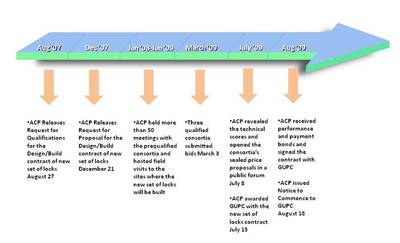Panama Canal Authority Notice to Commence
The Panama Canal Authority (ACP) reached a critical milestone for the Canal Expansion Program moving ahead on time and on budget. Culminating months of arduous work, the ACP received Grupo Unidos por el Canal’s (GUPC) performance and payment bonds and signed the contract. Today, ACP Executive Manager and Locks Project Management Division and Contracting Officer Jorge de la Guardia issued the Notice to Commence work slated for August 25, 2009.
The scope of work included in the contract encompasses the design and construction of the Canal’s new set of locks and water-saving basins on both the Pacific and Atlantic ends of the Canal.
“This event marks both an end and a beginning for the Canal Expansion Program,” said Jorge de la Guardia. “The fair, rigorous and transparent contracting process for the new set of locks has concluded. A new partnership with Grupo Unidos por el Canal has begun.”
GUPC, composed of Sacyr Vallehermoso S.A., Impregilo S.p.A., Jan De Nul n.v. and Constructora Urbana, S.A., together with its surety, Zurich American Insurance Company, submitted a $400 million performance bond and a $50m payment bond on August 11.
“Today’s issuance of the Notice to Commence is, without a doubt, one of the most significant moments for the ACP since we broke ground on expansion in September 2007,” said Panama Canal Administrator/CEO Alberto Alemán Zubieta. “None of this would be possible today without the hard work of all the men and women of the ACP, our external consultant Deloitte and all the parties involved, which have been instrumental in executing an airtight contracting process.”
The new set of locks contracting process began August 28, 2007, when the ACP released its request for qualifications for the project. The ACP announced four prequalified consortia, comprised of 30 companies from 13 countries, and released its request for proposals December 21, 2007. From January 2008 through January 2009, the ACP held more than 50 meetings with the prequalified consortia and hosted field visits to the sites where the new set of locks will be built.
On March 3, three of the four prequalified consortia submitted bids for the contract during a public ceremony. The sealed price proposals, including the ACP’s sealed owner’s price, were signed by the Notary Public, the ACP Contracting Officer and the Canal’s Inspector General and subsequently locked in a vault in Panama’s National Bank. The technical proposals were delivered to the Technical Evaluation Board, 15 highly qualified ACP engineers with substantial and diverse technical experience, to be assessed and scored.
Upon completion of the technical evaluations, the ACP revealed the technical scores and opened the consortia’s sealed price proposals in a public forum July 8. The ACP calculated a final weighted score – constituting 55 percent for the technical proposal and 45 percent for the price submission – and showed on a large screen that GUPC garnered the highest total points.
After ensuring GUPC’s price proposal and contractor’s qualifications complied with the established ACP requirements, the ACP awarded the consortium with the new set of locks contract July 15.
All of the consortia were notified of the results and given five days to review all of the documentation regarding the evaluations, as well as the proposals of the other consortia. Following the five-day review, the ACP gave the consortia three days to file a protest. The ACP did not receive any protests from the competing consortia.
Expansion will build a new lane of traffic along the Panama Canal through the construction of a new set of locks, which will double tonnage capacity and allow the transit of much longer, wider ships.
4. BMT Cordah Contract with Yemen
BMT Cordah has signed a major environmental contract with the Yemeni government in connection with the preparation of a set of technical guidelines and regulations that cover the use of chemicals and types of waste generated by the oil and gas sector.
The contract is the first of its kind in Yemen and represents a major step forward in regulating the environmental impacts arising from the oil and gas sector. The contract also marks the entry of BMT Cordah into this new region, where additional business opportunities are expected to arise in the near future.
The contract covers the following 3 areas:
• design and preparation of a set of permits and consents to effectively regulate the oil and gas industry use of chemicals and management of waste;
• completion of a set of site visits to gain a detailed understanding of the existing onshore production operations and associated environmental impacts; and
• completion of a formal capacity-building training exercise to be held in-country across a 1 week period.
Upon signing the contract, the Minister of Oil and Minerals Salem al-Aidrous said the treaty aims to create a national and complete system to manage chemicals and wastes arising from oil and gas exploration and production.
Within a wider context, the study will result in the Republic of Yemen being a more attractive location through an enhanced regulatory structure. The BMT Cordah Project Manager Stuart Hume said how important this contract was to the company and that he looks forward to the project and assisting the Yemeni Government in enhancing the current level of environmental protection.
(www.bmtcordah.com)














